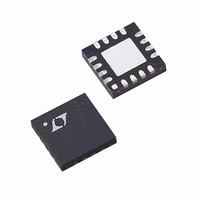LT5517EUF Linear Technology, LT5517EUF Datasheet - Page 5

LT5517EUF
Manufacturer Part Number
LT5517EUF
Description
IC DEMOD QUAD 40-900MHZ 16-QFN
Manufacturer
Linear Technology
Datasheet
1.LT5517EUF.pdf
(12 pages)
Specifications of LT5517EUF
Function
Demodulator
Lo Frequency
80MHz ~ 1.8GHz
Rf Frequency
40MHz ~ 900MHz
P1db
10dBm
Gain
3.3dB
Noise Figure
12.4dB
Current - Supply
110mA
Voltage - Supply
4.5 V ~ 5.25 V
Package / Case
16-QFN
Lead Free Status / RoHS Status
Contains lead / RoHS non-compliant
Available stocks
Company
Part Number
Manufacturer
Quantity
Price
Company:
Part Number:
LT5517EUF
Manufacturer:
LT
Quantity:
10 000
Part Number:
LT5517EUF
Manufacturer:
LINEAR/凌特
Quantity:
20 000
Part Number:
LT5517EUF#PBF
Manufacturer:
LINEAR/凌特
Quantity:
20 000
Part Number:
LT5517EUF#TRPBF
Manufacturer:
LINEAR/凌特
Quantity:
20 000
PI FU CTIO S
f
GNDRF (Pins 1, 4): Ground Pins for RF Termination.
These pins are not internally connected, and should be
connected to the PCB ground plane for best RF isolation.
RF
are internally biased to 2.30V. These two pins should be
DC blocked when connected to ground or other matching
components. The inputs can be terminated in a single-
ended configuration, but differential input drive is pre-
ferred for best performance. An external matching network
is required for impedance transformation.
EN (Pin 5): Enable Pin. When the input voltage is higher
than 1.6V, the circuit is completely turned on. When the
input voltage is less than 1.3V, the circuit is turned off.
V
should be decoupled using 1000pF and 0.1 F capacitors.
GND (Pins 9, 11): Ground Pins. These pins are internally
tied together and to the Exposed Pad. They should be
connected to the PCB ground plane.
TYPICAL PERFOR A CE CHARACTERISTICS
RF
CC
120
110
100
90
80
60
50
U
+
= 800MHz, P
70
, RF
–15
(Pins 6, 7, 8, 12): Power Supply Pins. These pins
RF-LO Isolation
vs RF Input Power
T
V
A
CC
–
= 25 C
= 5V
(Pins 2, 3): Differential RF Input Pins. These pins
U
–10
RF INPUT POWER (dBm)
2XLO
–5
= –10dBm, unless otherwise noted. (Test circuit shown in Figure 2)
f
f
f
RF
RF
RF
U
= 400MHz
= 800MHz
= 40MHz
0
W
5
5517 G13
U
10
–2
–4
6
4
2
0
0.1
Conv Gain
vs Baseband Frequency
f
V
2XLO
CC
T
A
= 5V
= 25 C
= 1602MHz
BASEBAND FREQUENCY (MHz)
1
T
T
A
A
= –40 C
= 85 C
10
2XLO (Pin 10): 2XLO Input Pin. This pin is internally
biased to 1V. The input signal’s frequency should be twice
that of the desired demodulator LO frequency. The pin
should be AC coupled with an external DC blocking
capacitor.
Q
Pins of the Q-Channel. The internal DC bias voltage is
V
I
Pins of the I-Channel. The internal DC bias voltage is
V
Exposed Pad (Pin 17): Ground Return for the Entire IC.
This pin must be soldered to the printed circuit board
ground plane.
OUT
CC
CC
OUT
–
– 0.78V for each pin.
– 0.78V for each pin.
–
, I
, Q
100
OUT
OUT
+
5517 G14
+
(Pins 15, 16): Differential Baseband Output
1000
(Pins 13, 14): Differential Baseband Output
–15
–20
–25
–10
–5
0
RF, 2XLO Port Return Loss
vs Frequency
0
0.40
FREQUENCY (GHz)
0.80
RF
LO
1.20
LT5517
1.60
5517 G15
5
5517f
2













